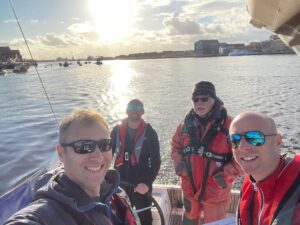 RYA Day Skipper Practical is the most popular of all the RYA practical courses and is the key to setting off on your own whether on your own boat or charter.
RYA Day Skipper Practical is the most popular of all the RYA practical courses and is the key to setting off on your own whether on your own boat or charter.
The test applied as per the RYA; ‘You will learn pilotage, navigation, seamanship and boat handling up to the standard required to skipper a small cruising yacht safely by day in waters with which you are familiar’.
The Course duration is five days during which the Instructor will demonstrate practical skills for you to try and you will be assessed on a continuous basis.
Successful seafarers will also be able to apply for the International Certificate of Competence (ICC) without further assessment. In short you are then free to set out on your own adventures at sea and take on the responsibilities of a skipper towards crew, other seafarers and anyone who dares to cross your path.
It is right, therefore, that you need certain standards and experience at the commencement of the 5 day Course and at Northumbria Sailing this is what we will expect you to possess already in your own interests, of other crew members and others at sea.
Practical Skills & Seatime
A Competent Crew Course is insufficient preparation for Day Skipper. Course participants should really have had more experience than 5 days crewing, the key element is that they should know how to sail reasonably efficiently, for instance to be able to tack, gybe and trim a sail. Experience should include 100 logged sea miles, 5 days onboard a yacht and 4 night hours. To have acquired some basic navigational and pilotage knowledge, also.
Theory
This is not a theory Course and a pre-existing level of theory and experience is required to be successful. In response to a June 2022 query concerning another sailing school, I received this from RYA Training; ‘The student should really have had the navigation knowledge prior to attending the practical course, however that seems to have not happened’. Both Theory and Practical pre-quirements are needed at the time of booking.
- be able to plot the position of the yacht on a chart using GPS
- be able to work out a CTS – for practical purposes where we sail it isn’t needed to take tide and leeway into account as where there is tide it’s not possible to work out a meaningful CTS using streams as you’re with/against the stream. Other areas, especially the Solent, are very different
- understand tidal data – HW LW – Heights, Range and times
- be able to use a standard port, eg North Shields, data to calculate tidal height
- good awareness of the ColRegs
- awareness of factors influencing a boat’s stability
- understand pilotage; create a pilotage plan for Tyne, Hartlepool, Amble or Blyth.
- be able to use the plotter for basic navigational tasks – e.g. CTS; distance to WP
